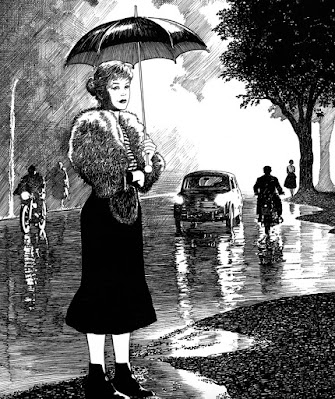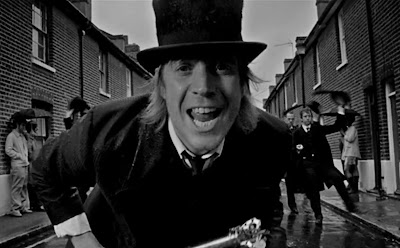Remina (2020, Viz Media)Story and Art: Junji Ito
Rating: Seven of Ten Stars
A rogue planet emerges from a wormhole and the astromoner who discovered it names it after his daughter, Remina, who becomes an instant global celebrity. When it becomes apparent that the planet is a destructive force, and that it is heading straight for Earth at unimaginable speeds, all of humanity turn from loving Remina to hating her... and soon, she is hunted by mobs who believe that if they sacrifice her, the Planet Remina won't destroy the Earth and all of humanity.

I have said in previous posts (
here and
here, for example) that Junji Ito is one of the few people who is a true master of the very difficult art of creating effective horror comics. That view is reaffirmed with "Remina", in which Ito uses a backdrop of literal cosmic horror to deliver commentary on a whole host of negative aspects of the human race, as well as reminding the reader that disasters can also bring out the best in some of us. And, ultimately, in "Remina", the world doesn't end with a bang, or a whimper, but with the largest slapstick comedy routine since time began. (And, no, I am not breaking my self-imposed rules on spoilers here; there is really no OTHER way this story could end than with the destruction of Earth. This is something that's obvious when you're ten pages in, and it keeps getting reinforced as you progress through the book.)
However, there is a weakness in "Remina" that underscores where Ito's true strength lies: In telling short stories.
Although "Remina" uses the same sort of cosmic, Lovecraftian horror that Ito has previously drawn on in
"Uzumaki", this book does not invoke the same level of gut-wrenching horror in the reader that his previous work did. Although the tales in "Uzumaki" add up to a single, novel-length story, each is also a self-contained short story. The longer tale in "Remina" never reaches the level of intensity that's present in the "Uzumaki" tales--even if the crucifixion/human sacrifice scenes come close.
Similarly, there are several stories in
Ito's famous "Tomie" cycle that convey the message that obsession is a destructive force (whether it be adoration or hatred) and that the human tendency to mob action will always end badly both for the actors and for the thing or person being acted upon more effectively than is done here.
What I think "Remina" shows very clearly is that Junji Ito is far better at telling short stories than he is at creating novel-length works. This isn't a bad book; it's just not as good as some of his other works. The horror is more impactful in his short stories than what we get here, and the characters are more interesting overall, despite the room Ito has to develop them in this longer format work. That said, I understand that the title character of this work is something of a useless dishrag and perpetual victim by design. At no point does she have it in her to be the figure deserving of the admiration nor scorn and hatred that the entire world heaps upon her in their superstitious zealotry. Therefore, she never rises to the occasion of fighting back in any way, but instead is swept along by events and defended at every turn by others.

Thematically, Remina is a perfect lead character for this story, but she pales in comparison to other Ito leads--female or male--and she really isn't the right character to carry a long-form story like "Remina". That said, though, she IS the perfect heroine to be in the extended aerial chase scene toward the end of the book, during which she is literally being swept along by circumstances completely out of her control.
Artwise, the book is of the caliber we've come to expect from Ito. The Lovecraftian imagery of the Planet Remina's surface is some of the most bizarre and intricate he's created, and the rest of the art is as sleek as it always is. The work here may lack some of the intensity of some of his other efforts, but it is nonetheless still very in the quality of workmanship that is displayed.










































